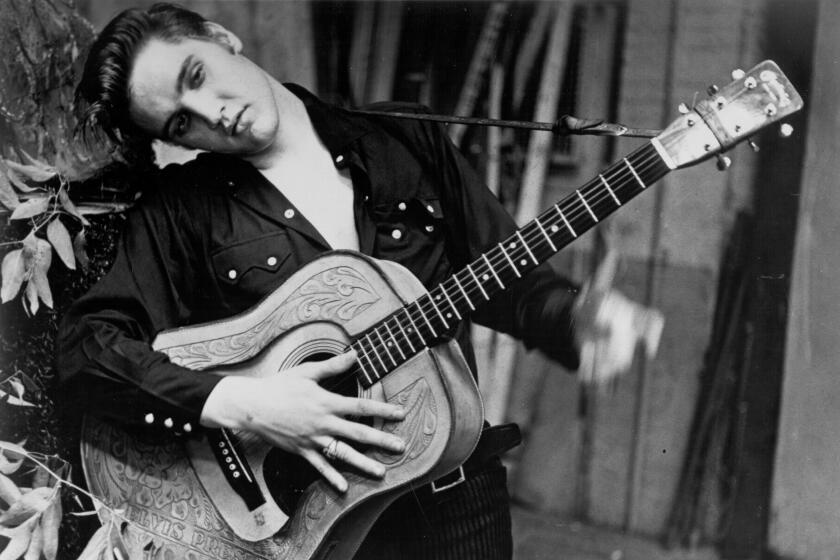Column: What’s wrong? You didn’t want that vacuum cleaner for Christmas?

- Share via
This is the season of high hopes, great expectations and, to be honest, grave disappointment.
I am not speaking about world peace or an end to poverty and hunger. I am speaking, of course, about Christmas presents.
Those of us who celebrate the holiday, who are lucky enough be able to afford gifts for friends and loved ones, know that we are just one waffle maker away from destroying, for example, a perfectly serviceable marriage.
I am not saying I am no longer married because of the Army/Navy surplus store ammo bag my husband purchased for me one year, thinking it would make a great purse. Or because of the landline telephone he bought me, with oversized numbers that would have been appropriate for someone with macular degeneration. Or the longed-for giant Teflon-coated roasting pan that he presented to me, pleased for having paid far below retail because there was a giant scratch on the Teflon.
Don’t get me wrong — the man gave me many wonderful and thoughtful gifts over the course of our 30 years together. But somehow, it’s the clunkers that tend to stick out. I’m sure I gave my share of dud gifts too.
It took me awhile to realize that many of the rules about gift giving that I had internalized from childhood and insisted upon in my marriage — the main gift cannot be in the stocking, even if it’s small, for example — are stupid and certainly not universal.
You probably won’t be surprised to learn that there is actually a body of research that addresses the widespread phenomenon of present resentment, which is called “miscalibrated gift choice” or “self-other mismatch.”
Turns out that a gift rift is not a trivial thing. (Just ask my ex.)
“There can be major consequences for giving ill-chosen gifts,” wrote a trio of business professors in the journal Current Directions in Psychological Science. “For instance, recipients become annoyed if a gift does not match their preferences, potentially weakening the relationship between giver and recipient. At best, a poorly chosen gift will irritate the recipient, and at worst, it may drive the giver and recipient apart.”
The paper was published in 2016, but I’m pretty sure what the authors describe is timeless.
Here’s where tension occurs, say the authors: “Givers primarily focus on the moment of exchange, whereas recipients primarily focus on how valuable a gift will be once owned.... Givers will prize aspects of a gift that make it seem optimal when initially gifted (e.g., surprisingness, desirability), whereas recipients will appreciate aspects of a gift that make it better to own (e.g., usefulness, versatility).”
Let’s make it the first holiday season where we avoid a surge of COVID infections. It’s doable. Considering it’s our third winter since the pandemic began, we should be pros at using the tools that we have to avoid getting COVID.
Could this explain the proliferation of “funny” gifts at Christmas: Your friend’s face on a real potato? Slippers that look like a loaf of bread? A roll of toilet paper that says, “I finally got you a gift you can use.” Reindeer poop?
There are all kinds of emotional undercurrents at play in close relationships that can affect how a gift is perceived. A friend of mine was offended one Christmas by the bottle of perfume her husband chose for her. She liked the way it smelled, but she was righteously bent out of shape when he told her he’d first smelled it on another woman.
Regifting can be another perilous realm this time of year.
I’m all in favor of the practice — it seems downright environmentally friendly these days — but it can backfire. Nancy Reagan was famous (infamous?) for recycling gifts from a closet full of free samples and unwanted, frequently elephant-themed gifts from admirers, according to one of her biographers. Her stepdaughter Maureen received for her wedding a set of 36 pewter swizzle sticks topped with tiny elephants. Reagan crossed a line, though, after her grandson Cameron left a teddy bear at the White House during Ronald Reagan’s first inauguration, and she wrapped it and sent it back to him in California for his third birthday.
Understandably, gift rift is painful for little kids.
Although we’d like them to be gracious, it’s hard for children to conceal disappointment. Their social graces are pretty much nonexistent and, frankly, there is something almost refreshing about their honesty.
One of my nieces, now grown, was very picky about gifts when she was little and was unabashed about showing it. One Christmas, when I gave her a gift she didn’t like, she asked if there was anything else she could have.
“Nope,” I said, “that’s it.”
“Then I am never coming back here again!” she yelled, and stomped out of the room.
A couple of years later, I gave her a doll that looked like a mermaid, with a shimmering green bodice. She was unimpressed.
“No offense, Auntie Robin,” she said, “but dolls are not really my thing.”
These days, I don’t worry about receiving disappointing gifts because a) It really is the thought that counts; and b) I never have enough socks; and c) I can basically buy anything I want for myself.
The mixed emotions of the holidays have helped create some wonderful music that reminds us that together we can ‘muddle through, somehow.’
For the past couple of years, in fact, I have ordered an expensive pair of pajamas, wrapped them up and stuck them under the tree. The gift tag is designed for the sole purpose of scandalizing the 12-year-old niece who lives with me. “To Robin,” it says, “with love from all your boyfriends and Santa.”
“You don’t have any boyfriends!” says my niece with glee.
That may or may not be true.
But one thing’s for sure: There will always be at least one gift I really want under our Christmas tree.
No more gift rifts chez moi. My boyfriends and Santa always come through.
More to Read
A cure for the common opinion
Get thought-provoking perspectives with our weekly newsletter.
You may occasionally receive promotional content from the Los Angeles Times.














